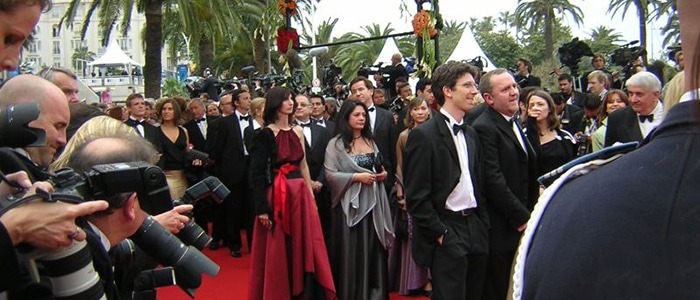Boost Your Conversation Skills: Use French Transition Words
You are at the Cannes Film Festival in France. You want to describe all of the marvellous sights you see on the red carpet as the stars arrive for a film premiere. Your first attempt might go something like this:
The paparazzi and film crews were set in action. The leading actress stepped out of the limousine. The golden dress sparkled. It was stunningly styled with jewels. The jewelry the actress wore was even more beautiful than her dress. The second actress looked beautiful on the red carpet. Her apparel was simply divine. She twirled her sheer pink silk dress for the cameras. It had white ruffles. The lead actor from this film arrived. He was dressed is a snappy designer suit. His dark sunglasses glistened in the sparkling sunset. This set the tone for this star studded evening.

While the sights on the red carpet were stunning, the written description here needs a little work. It is choppy and each sentence stands as an island on its own. What it is lacking are transition words that link two or more ideas together in order to give the reader or listener important information about how those ideas relate to each other. Let’s try this red carpet description again, this time using transition words:
The paparazzi and film crews were set in action as the leading actress stepped out of the limousine. The golden dress sparkled since it was stunningly styled with jewels. However, the jewelry the actress wore was even more beautiful than her dress. The second actress looked beautiful on the red carpet because her apparel was simply divine. Just after she twirled her sheer pink silk dress with white ruffles for the cameras, the lead actor arrived dressed in a snappy designer suit. His dark sunglasses glistened in the sparkling sunset, which set the stone for this star studded evening.
The italicized words are transition words. They connect the ideas. In fact, they are called les connecteurs in French. In this example you can see that the second description flows better and is more coherent or easier to understand. Using transition words in French will help listeners or readers to better understand what you are trying to say. Learning transition words will enhance your speech in French as well as your reading comprehension. This article will teach you a few introductory French transition words and give examples of how to use them.
Adding Emphasis and Connecting Your Ideas
There are many French transition words that allow you to add emphasis and strengthen the point you are making. Here are a few examples:
Ainsi que – as well as
Également – equally
Et puis – and finally
Here is an example in a sentence:
Si le film a beaucoup de publicité ainsi que les bonnes critiques, il réussira.
If the film has a lot of publicity as well as good reviews, it will succeed.

Cause and Effect
These transition words allow you to elaborate on a point by discussing reasons why or how something happens. Here are a few examples:
Ainsi – in this way/ thus
Alors – therefore
Car – because/ as
Donc – therefore/ so then
En raison de – because of
Parce que – Because
This is an example of a cause and effect transition word in a sentence:
Le film est très magnifique parce que le directeur a fait beaucoup d’attention aux détails.
The film is so wonderful because the director paid attention to detail.

Transition Words that Compare and Contrast
You can use French transition words to compare and contrast two similar or opposite things. The following are examples of comparative and contrasting transition words:
Comme – as/ like/ as well as
Semblablement – similar
Alors que – while/ when/ even though
Au lieu de – instead of
Malgré – despite/ in spite of
Tandis que – whereas/ while/ when
Here is an example using a transition word to contrast two roles in a film:
Il a un rôle sérieux dans le film, alors qu’elle a un rôle comique.
He has a serious role in the film while she has a comedic role.
Putting Your Ideas in Order
These transition words show the sequence things happen in. They will inform the reader or listener what order things happened in.
D’abord – first
Deuxième – second
Troisième – third
Puis – then
Après – after
Plus tard – later
Dernier (masculine)/ dernière (feminine) – last
This example contains two transition words that put the events in order for the reader:
D’abord, les acteurs, les actrices et le directeur ont marché sur le tapis rouge. Après, ils ont regardé le film dans le théâtre.
First the actors, the actresses and the director walked the red carpet. After, they watched the film in the theatre.
Write Your Own Sentences with French Transition Words
Try writing a paragraph that uses four or five transition words. You could try writing the paragraph first without transition words and then edit your writing by adding them in where appropriate. There are many more transition words in French than those listed in this article, so you can seek out the ones that best fit your writing. Try finding places in your writing that need a little more flow or where two ideas can be linked together nicely.
Consider writing a journal article about a sequence of events that took place to use transition words to put the events in order. You could also write a comparative piece to use comparing and contrasting transition words.

Enhance Your Comprehension and Conversation Skills
Enfin (Finally), learning French transition words will ultimately help you to enhance your comprehension and conversation skills in the language. They will make you sound more sophisticated and knowledgeable.
Using transition words in French will help to eliminate your use of short, choppy sentences that simply don’t flow together well. Not to mention, you won’t sounds like a robot because your sentences will be more fluid. Adding a few new transition words to your vocabulary in French will make all the difference in becoming proficient in the language.
LingQ is the best way to learn French online because it lets you learn from content you enjoy! You can import videos, podcasts, and much more and turn them into interactive lessons. Keep all your favourite language content stored in one place, easily look up new words, save vocabulary, and review. Check out our guide to importing content into LingQ for more information.
LingQ is available for desktop as well as Android and iOS. Gain access to thousands of hours of audio and transcripts and begin your journey to fluency today.
***
Rachel Graf taught French classes for eight years after studying the language in university and through French immersion programs in France and Quebec. She is also learning Spanish and German.

